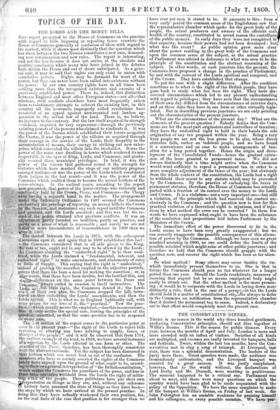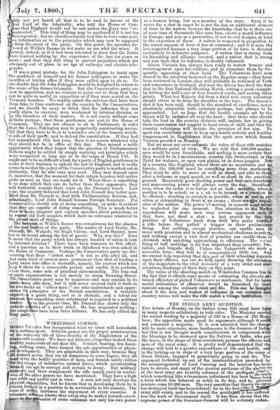THE CONSERVATIVE DINNER.
THERE is no reason in the world why three hundred gentlemen, professing Conservative principles, should not dine together at Willis's Rooms. This is the season for public dinners. Every year, between the months of April and July, London is more and more crowded with an influx of visitors. Societies of all kinds are multiplied, and excuses are easily invented for banquets, balls and festivals. Twice, within the last ten months, have the Con- servatives met to sing a song of triumph. At Liverpool, last year, there was a splendid demonstration. The leaders of the party w,ere there. Great speeches were made, the audience was tremendously enthusiastic, and the Liverpool banquet was counted for a great success. It was justly complained, however, that to the world without, the declarations of Lord Derby and Mr. Disraeli, were wanting in positiveness. The moment happened to be a critical one. Parliament was about to meet, and there were many questions on which the country would have been glad to be made acquainted with the policy of the Opposition. We have the same complaint to make of the banquet at Willis's Rooms, on Friday of last week. Sir. John Pakington has an amiable weakness for praising himself and his colleagues, on every possible occasion. We have'pro-- -
bly not 'yet heard all that is to be said in favour of the rat Lord of the Admiralty, who told the House of Com- ns that England would not be safe unless the icavy was " re- nstructed." This kind of thing may be pardoned if it is not too n repeated ; but we should certainly now like to have some posi- ve information as to the principles which may now be supposed form the creed of the party. On this point, the speeches de- vered at Willis's Rooms do not make us one whit the wiser. It oiled, indeed, as if it had been intended to show that the Tories i have learned nothing by the experience of the last ten years or t lore ; and that they still cling to ancient prejudices which are ( obviously out of place in an age of railways and electric tele- graphs.
1 It was a great mistake for Sir John Pakington to insist upon the readiness of himself and his former colleagues to make the i ' sacrifice of taking office if they were called upon to do so. No I One doubts that Sir John Pakington would be delighted to return to ! the scene of his former triumphs. But the Conservative party are now in opposition, and we venture to point out to them that they ( can be quite as useful in opposition as if they were seated on the j/ Treasury benches. We readily admit the services that have been from time to time conferred on the country by the Conservatives, I and we should be sorry to think that the influence they can jnstly claim to exercise, were weakened by internal division, or \by the blunders of their leaders. It is not surely without some definite purpose, that these gentlemen are sent to the House of Commons. They are not chosen to sit in Parliament, in order that Sir James Pakington may be perpetually constructing navies. All that they have to do is to remember one of the famous watch- t
/ words of their party, and to defend the constitution. If they had ' but remembered this last year, there is no reason whatever why they should not be in office at this day. They missed a noble opportunity when they forgot that the question of Parliamentary , Reform might be settled by simply carrying out principles which ' were recognized as long ago as in the reign of Henry VII. It ought not to be so difficult a task for a party of English gentlemen to make it their business to uphold the law of England, and it really seems to us that the policy of the Conservative party is marked out so distinctly, that he who runs may read. They may depend upon it, moreover, that the moment for their return to power will arrive quite as soon as they are ready for it. When there is something to be done which they can do better than their opponents, they will forthwith resume their seats on the Treasury bench. Last year, the country believed that Lord John Russell was better qua- Wed than Mr. Disraeli to deal with Parliamentary Reform, and, aotectii_ngly-,-Lord John Russell became Foreign Secretary. The Conservatives should aim at doing something, or make it evident • that they are capable of doing something. This is much better than to make eloquent and copious speeches about patriotism, or to repeat old Tory couplets which have no relevance whatever to the actual state of things.
. The banquet at Willis's Rooms was conspicuous for the absence of the real leaders of the party. The names of Lord Derby, Mr. Disraeli, Mr. Walpole, Sir Hugh Cairns, and Lord Stanley, were 'not to be found among the list of guests. Why was this ? Does It mean that the party which has always boasted of union is torn "by internal division ?- There have been rumours to this effect, and a question as to their truth or falsehood was even asked in the House of Commons. Perhaps the Conservative party are dis- lovering that their "ablest man" is not so able after all, and ;Ii-at some kind of success more permanent than that of leading a liarty twice into office is desirable, namely, the success which can ,keep it there for a reasonable period, and enable it to perform, :alien there, some acts of practical statesmanship. The true end iof 'party organizations is not merely to storm Downing Street. - The Conservative party may be numerous and may contain in its ranks itiany able men, but it will never succeed until it finds in its own tanks an "ablest man ;" one who understands and appre- ciates th capacity sarcasm, ' leader. outside (In Ins adaptatTons have been utter failures. He has only edited the I Tory part.
principles of the British constitution. A versatile a great thing, and so is rhetoric, and a talent for pt something more substantial is required in a political to the present time, Mr. Disraeli has shown only the ties of a party chief. Ho has originated nothing;



























 Previous page
Previous page